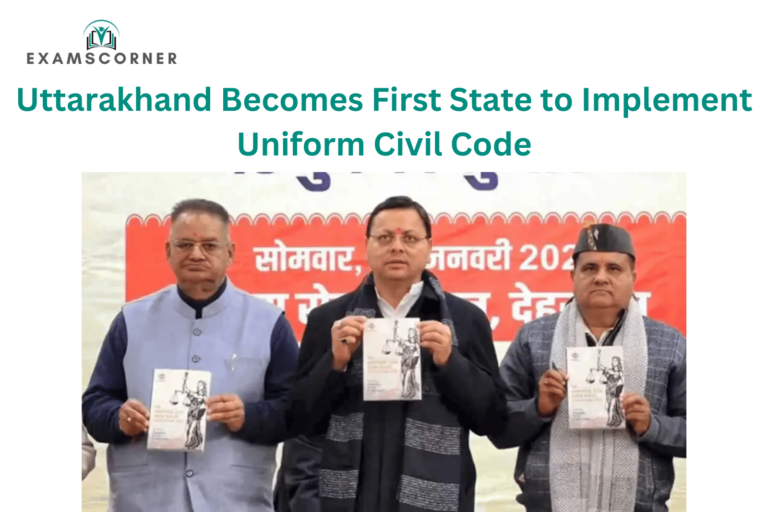Introduction
In a landmark move, Uttarakhand Chief Minister Pushkar Singh Dhami officially launched the Uniform Civil Code (UCC) for the state’s residents on Monday. With this historic step, Uttarakhand has become the first Indian state to implement the UCC post-Independence, excluding Scheduled Tribes and natives who have migrated out of the state. The introduction of the UCC aligns with the Bharatiya Janata Party’s (BJP) commitment to promote equality and harmony among citizens, this article we were see about Uttarakhand Becomes First State to Implement Uniform Civil Code, Launches AI-Enabled Portal.
Key Provisions of the Uniform Civil Code
The UCC aims to standardize personal laws across various communities, ensuring equal rights for all citizens regardless of religion or gender. Key highlights of the UCC in Uttarakhand include:
- Ban on Discriminatory Practices: Practices such as halala, iddat, and talaq (related to marriage and divorce in Muslim Personal Law) have been prohibited.
- Equal Rights for Women: The code ensures gender equality in matters related to property and inheritance.
- Mandatory Online Registration: The UCC mandates the online registration of marriages, divorces, and live-in relationships through a dedicated government portal, ucc.uk.gov.in.
Features of the UCC Portal
The government portal, designed to facilitate seamless compliance with the UCC, offers several advanced features:
- Online Record Access: Residents can access marriage, divorce, and relationship records.
- Complaint Registration: Users can lodge complaints directly through the portal.
- Will Upload Facility: Citizens can upload their wills for safekeeping and future reference.
- Aadhaar-Based Verification: Ensures authenticity and security of records.
- AI-Based Translation: Content is available in 22 languages, including English, to ensure accessibility for all citizens.
- Data Integration: The portal integrates information from over 13 government departments, including civic bodies, police, and courts.
During the launch event, Chief Minister Dhami personally registered his marriage on the portal, emphasizing its user-friendliness and efficiency.
Political and Social Significance
Speaking at the event, Mr. Dhami described the implementation of the UCC as the “beginning of a new era of equality and harmony.” He expressed gratitude to Prime Minister Narendra Modi and Home Minister Amit Shah for their support in achieving this milestone.
“Under the able leadership of the respected Prime Minister Narendra Modi and Home Minister Amit Shah, our government has implemented the UCC in Uttarakhand. Today is a special day not just for the people of this state but for the entire nation,” Mr. Dhami stated.
He also expressed optimism that Uttarakhand’s initiative would inspire other states to adopt the UCC, paving the way for national-level implementation. “This stream of equality emanating from Uttarakhand will irrigate the entire country in the near future,” he added.
Public Reaction and Future Implications
The rollout of the UCC has been hailed as a progressive step toward ensuring uniformity and fairness in personal laws. It is expected to foster greater social cohesion and eliminate discriminatory practices that have persisted for decades. However, the exclusion of Scheduled Tribes and natives who have migrated out of the state reflects an attempt to balance modernization with cultural sensitivities.
Conclusion
The implementation of the Uniform Civil Code in Uttarakhand marks a significant milestone in India’s journey toward equality and inclusivity. With the launch of the state-of-the-art UCC portal (Uttarakhand Becomes First State to Implement Uniform Civil Code, Launches AI-Enabled Portal), Uttarakhand has set an example of how technology and governance can come together to empower citizens. As the first state to take this bold step, Uttarakhand’s move is likely to ignite discussions and inspire similar initiatives across the country.



